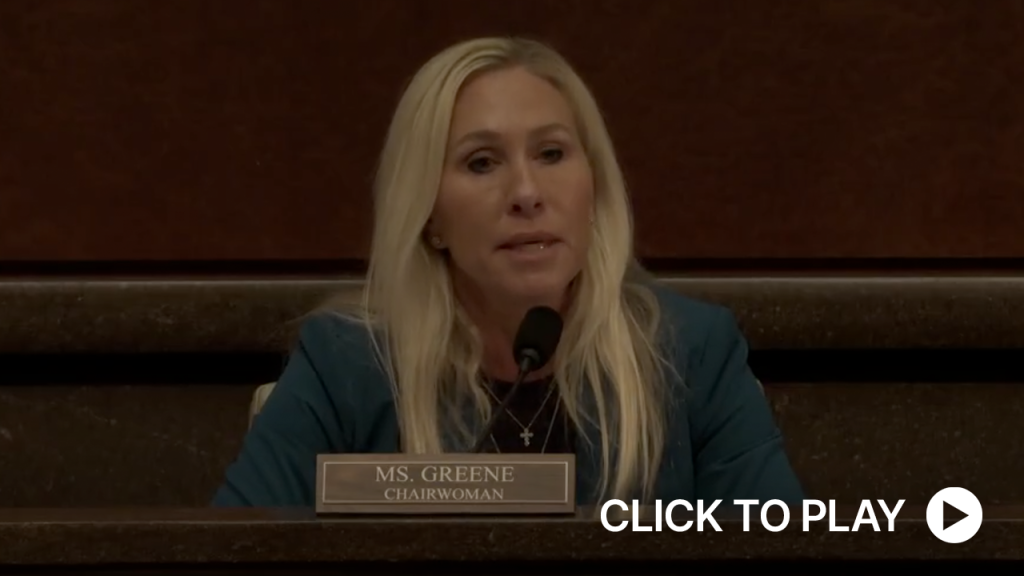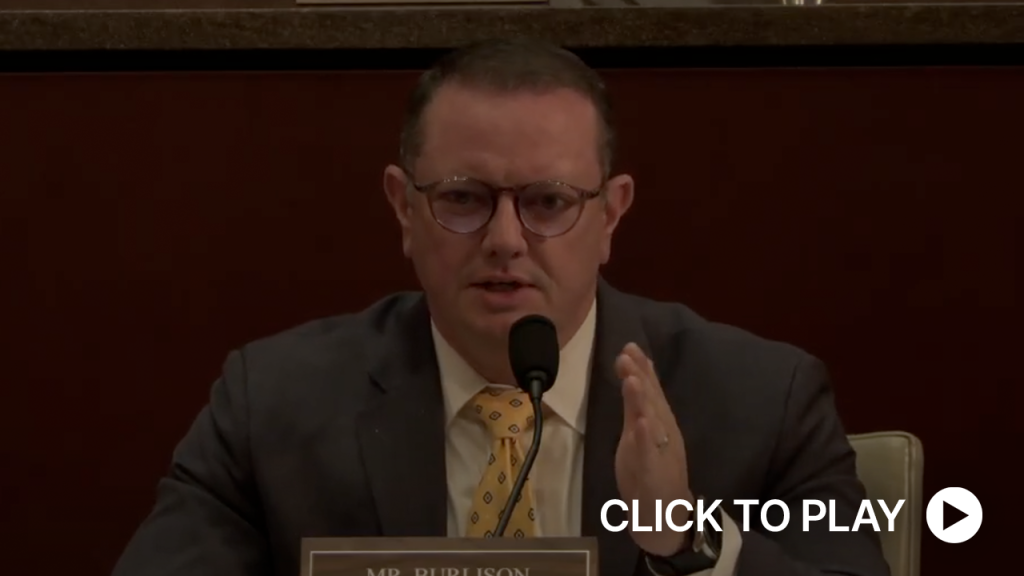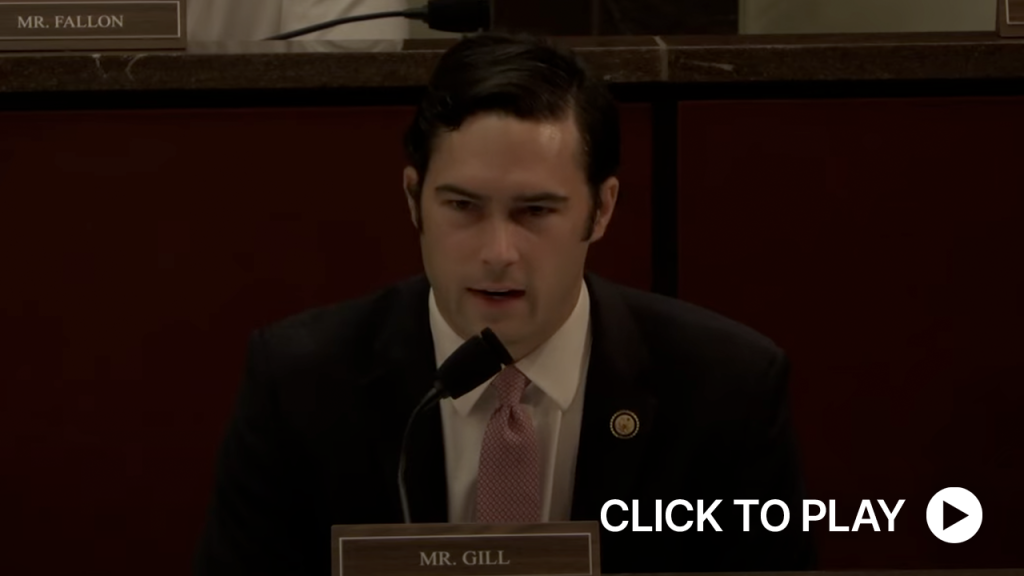Hearing Wrap Up: Subcommittee Demands Transparency of Government Weather and Climate Engineering
WASHINGTON—Today, the Subcommittee on Delivering on Government Efficiency held a hearing titled “Playing God with the Weather — a Disastrous Forecast.” During the hearing, members analyzed the federal government’s role in weather control and geoengineering activities and any potential underlying consequences of such involvement. Members also examined the ethical and legal issues surrounding the use of weather and climate control technology.
Key Takeaways:
The results and consequences of weather control and geoengineering activity are unknown and poorly understood.
- Dr. Roger Pielke Jr., Senior Fellow at the American Enterprise Institute, testified that “[W]eather modification activities have been widely implemented in the United States and around the world for 70 years. Many decades ago, weather modification was called weather control. Nobody calls it weather control anymore, because scientists understand that controlling the weather is simply not possible. Despite the long track record of experience with operational weather modification activities, the effectiveness of weather modifying activities for actually modifying the weather is unknown. A hypothesis worth exploring systematically would be whether the precise quantification of the outcomes associated with weather modification is even possible, given the scientific record. ”
Any deployment of climate control technology would require navigating complex ethical and legal issues involving who controls the “weather dial.”
- Christopher Martz, Meteorologist and Policy Analyst at the Committee for a Constructive tomorrow, testified that “Nine states actively facilitate cloud seeding programs, but they have strict regulations about when and where they can be implemented. There are two states, however, that have [it] banned, which are Florida and Tennessee. Now, geoengineering is a different issue from that. It’s the proposed attempt to counteract global warming by either removing CO2 from the atmosphere or altering amount of sunlight that reaches the Earth’s surface, the latter of which is a very controversial topic… The [Intergovernmental Panel on Climate Change] says that, with high agreement, that it could limit global warming to below 1.5° Celsius above pre-industrial levels. Now, in regard to whether cloud seeding should be banned, I’m of the view that we should minimize the interference with nature.”
- Mr. Martz also testified that “While the planet has gotten warmer over the last 100 years, there is uncertainty as to exactly how much influence humans have exerted on it, and this uncertainty arises from the fact that climate models produce too much warming with known physics, which is why modelers have to artificially calibrate their models to the instrumental temperature record. There’s uncertainty in the magnitude of the actual energy flows as measured by satellites, which is six times larger than the estimated energy imbalance caused by CO2, which means that warming could be mostly natural, and we just don’t know; or it could be mostly anthropogenic. And finally, there is no fingerprint of anthropogenic or manmade global warming that distinguishes it from natural variability. These uncertainties need to be resolved in the peer reviewed literature before world governments try to much less consider intentionally altering the radiation balance with novel technologies that have not been tested.”
The American people deserve transparency and accountability from the federal government on how taxpayer funds are being used for geoengineering activities and weather manipulation.
- Congressional oversight of geoengineering activity is critical to ensuring American taxpayer dollars are used wisely.
- Dr. Pielke testified that “[First], Congress should enact legislation to improve oversight of weather modification activities, including first requesting an assessment from the national academy of sciences that precisely quantifies what is known and unknown about the effectiveness of weather modification projects to date, and clarifying the prospects for ever being able to achieve certainty in quantifying that effectiveness. [Second], improving the required reporting and communicating of weather modification activities. Under the 1972 law that defines weather modification in the United States. Congress should standardize U.S. Federal law governing weather modification, ensuring that all states are governed by identical legislative authority.”
Member Highlights:
Subcommittee Chairwoman Marjorie Taylor Greene (R-Ga.) discussed with witnesses how the Earth’s climate and temperatures have fluctuated since its beginning.
Subcommittee Chairwoman Greene: “I’ll start with you, Dr. Pielke. Has the Earth’s, climate and temperatures—has that been something that has changed historically since the creation of the world?”
Dr. Pielke: “Yeah, there’s long time series that go back thousands, millions of years showing vast changes. However, the changes over the last century and a half have been judged to be largely driven by the accumulating greenhouse gases in the atmosphere, so that’s not particularly controversial. What is controversial is, ‘what are the effects? When will we know them?’ I would disagree with [Dr. Michael MacCracken, Minority witness] that we can control weather with carbon dioxide emissions. There’s no knob that says more extreme weather, less extreme weather. There’s a lot of great reasons for reducing carbon dioxide emissions, but I don’t think anyone should think we’re going to stop hurricanes or floods or atmospheric rivers using that knob.”
Subcommittee Chairwoman Greene: “Mr. Martz?”
Mr. Martz: “I largely agree with Dr. Pielke about that assessment pretty much entirely. I do agree that obviously the planet has gone through all sorts of ebbs and flows throughout its 4.5-billion-year history, and obviously the Earth has gotten warmer over the last 100 years. And I do agree that some, most I don’t know, how much of it is due to CO2 emissions, because CO2 is a greenhouse gas. The laws of physics are very clear on that. However, there [are] uncertainties, as I highlighted in my testimony here, and this is something that some of the scientists who work very closely on this. One of them is Dr. Roy Spencer at the University of Alabama in Huntsville. He’s the science team leader on one of NASA satellites that measures the radiation flows in and out of the atmosphere. I know him very well.”
Subcommittee Chairwoman Greene: “Mr. Martz. I only have a short amount of time.”
Mr. Martz: “So, obviously, the natural energy flows in and out of the Earth’s atmosphere.”
Subcommittee Chairwoman Greene: “Right, but that’s not controlled by man. I mean, did man create the Ice Age?”
Mr. Martz: “No.”
Subcommittee Chairwoman Greene: “Yeah, right, so none of us were alive back then to know for sure.”
Rep. Eric Burlison (R-Mo.) asked about the impact of human activity on climate change and if weather control is effective.
Rep. Burlison: “So, I think if folks are listening or paying attention, you can definitively say you I mean, your PhD, your meteorology, you can definitively say that these are cloud seeding. While it may occur, it’s probably not occurring as often as people think, because its effects are unknown, not certain. And then, in addition, it only affects a small region. Would you both agree with that?”
Dr. Pielke: “Yes. For all the effort that’s been put into weather modification, if it is having an effects, they’re not large enough that we can really see them very clearly.”
Mr. Martz: “I would agree to that, yes.”
Rep. Burlison: “Would you say that in general, we kind of have a little bit of an arrogance about our impact on, on this planet?”
Mr. Martz: “Very much so…There’s also no increase in rapid intensification events globally…There have been increases in heavy rainfall in some regions, and there have been decreases in other regions, and some of that could be tied to a warmer, you know, atmosphere in the Clausius-Clapeyron region. But overall, the idea that we are able to control weather even through climate change is largely grossly overstated.”
Rep. Brandon Gill (R-Texas) inquired about differences between cloud seeding and geoengineering and the effectiveness of cloud seeding on weather control.
Rep. Gill: “Dr. Pielke, could you just briefly explain the difference between cloud seeding and geoengineering?”
Dr. Pielke: “I’ll give you the broad brushes, but cloud seeding is an effort to modify precipitation over a small scale. Geoengineering is an effort to counter the effects of human caused climate change at the planetary scale.”
Rep. Gill: “Got it. And last July, as you know, there were catastrophic floods in Texas. Have you seen any evidence to suggest that cloud seeding contributed to those floods, exacerbated the problem, or had any impact on them?”
Dr. Pielke: “I’ll defer to Chris [Martz], who’s talked about that in his testimony.”
Mr. Martz: “Sure. While there is evidence that cloud seeding can be effective, there’s also evidence that it’s not as effective. So ,there’s very inconclusive results in literature on it because natural variability is so large. As far as the Texas floods go, in particular, I think, the cloud seeding—the company that was accused of it, was Rainmaker, if I’m, if I’m correct on that. But when they did cloud seeding activities, they did it, I think two days before the rain began, and it was 200, I think it was 150 miles southeast of San Antonio, if I’m correct on that. Which means that in terms of the Texas hill country, there was no way for that cloud seeding to have had any material effect on the floods.”
…
Rep. Gill: “Given the complexity of the issue here and how large that this problem is, how do you study something like that?”
Mr. Martz: “I think that you would employ a group of scientists and you do some sort of bipartisan effort to look and see what we know about it and do a comprehensive, thorough report that would be people from different perspectives that come together and discuss and mesh out the details, and then conduct experiments on it; because in science, you can’t just also you can’t just use even modeling. You also have to test things and do it through a laboratory experiment to have observations, because all science is numbers.”
Click here to watch the hearing.
Legal Disclaimer:
EIN Presswire provides this news content "as is" without warranty of any kind. We do not accept any responsibility or liability for the accuracy, content, images, videos, licenses, completeness, legality, or reliability of the information contained in this article. If you have any complaints or copyright issues related to this article, kindly contact the author above.



